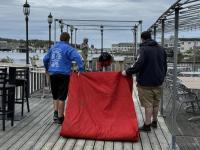Water district opposes ban on electronic devices
The Boothbay Region Water District Board of Trustees has got a bone to pick with state government.
A new bill, LD 1809, will effectively ban elected officials on certain municipal boards from participating in public meetings via phones or other electronic devices. If the bill passes, it could significantly change the way the Boothbay Region Water District conducts its meetings.
Water District Trustee Ken Marston of Boothbay currently spends his winters in Florida. He regularly tunes into the bi-weekly board meetings using a remote computer. For several years, Marston has used the video application Skype to watch, listen, interact and vote in a real-time with his fellow trustees.
Water District Manager Jon Ziegra heard about the proposed ban, and he immediately went to Augusta to testify against the bill.
“When we saw LD 1809, which was actually being ramrodded through, we only had two days to respond,” Ziegra said. “The bill is super discriminatory against retired people and senior citizens in the Boothbay region. A lot of people have earned the right to go to Florida. I'd hate to lose their wisdom and contribution. They bring a lot of the table.”
The legislature's Judiciary Committee approved LD 1809 on March 27. The law specifically prohibits quasi-municipal sewer and water districts from participating in meetings through electronic devices. The law also bans officials from participating in executive sessions from a remote access point. However, the law does not specifically state if other public municipal bodies such as school boards and selectmen meeting are included.
According to a recommendation by the Maine Right to Know Committee, which oversees Maine's Freedom of Access Laws, the current provisions in LD1809 are unclear. The committee has asked the legislature to clarify the language before it gets heard by House and the Senate.
Recently, the Maine State Attorney General's Office was asked to weigh in on the use of communication technologies by public bodies. A representative from the Attorney General’s office cited a 1979 statute from the Freedom of Access Law which found “the practice of conducting public proceedings over the telephone is inimical to the fundamental purpose embodied in the freedom of access law.”
In an email to the Boothbay Register, Ziegra expressed utter disbelief as to why a statue from 1979 could be invoked. “Technology has changed a lot since then, we are in the 21st century for God's sake,” Ziegra wrote.
And Ziegra is not alone. The bill has been met with opposition by water and sewer districts across the state, as well as the Maine Municipal Association.
“We're not convinced that these meetings are a violation of the law,” said Jeff McNelly, the executive director of the Maine Water Utilities Association. “As the bill is currently written, it discriminates against water and sewer districts to engage in this practice, so that begs the question, what does it do for municipal boards, school boards and other government boards?”
McNelly, Ziegra and other district managers have indicated that for now, they will look to their local charters as to whether voting by electronic devices should be permitted, and continue to conduct business the way they always have.
As for the Boothbay Region Water District, the board of trustees voted unanimously for Ziegra to amend the charter to allow elected officers to continue to Skype into meetings. In the meantime, Ziegra said he will be keeping his eyes on Augusta when LD 1809 heads before the House and the Senate.
Event Date
Address
United States





















